Thanks to the people who have contributed to this week’s newsletter: Duang Tengtrirat, Emma Wasson, Hayden Marks, Julie French, Michaela Carter, Paul Gale-Baker and Tahlia Sleeman.
People sometimes write to me with nice comments about the newsletter. I really appreciate such comments and they are, indeed, one of the main motivating factors for me carrying on producing a newsletter each week. Occasionally I receive a comment that is too poetic not to quote here. For example, here are two of the comments that I have received in the last few weeks.
“Thank you for the magic that arrives in my inbox each week.”
“This is such a wonderful newsletter … you are making a real difference. The time will come when people will appreciate food growing again and you will have done a great deal to help prepare the community for the harder times to come (as well as bring us much joy in the present!).”
Update on the proposed urban farm at Fabbro Fields in Eltham
Nillumbik Council has voted not to support the proposal for an urban farm at Fabbo Fields (aka 2 Bell Street) in Eltham. The vote of the councillors was 3 not supporting, 2 supporting, 1 not voting due to a conflict of interest and 1 not voting due to absence. The vote followed a community consultation where 53% were in favour of the concept and 46% were not. Read the official Council statement. Obviously this is very disappointing for Local Food Connect, whose project it is.
Kohlrabi – a friendly alien (by Julie French)
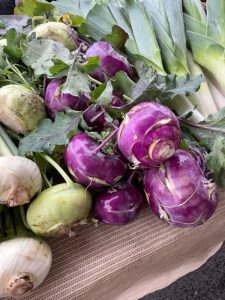 [Julie, from the Montmorency Community Group, cooks with less popular or familiar veggies and fruit. Here she discusses how to use and cook kohlrabi. A somewhat longer version of the article – which includes recipes for kohlrabi and chickpea soup and for buttery roasted kohlrabi – can be found on our website.]
[Julie, from the Montmorency Community Group, cooks with less popular or familiar veggies and fruit. Here she discusses how to use and cook kohlrabi. A somewhat longer version of the article – which includes recipes for kohlrabi and chickpea soup and for buttery roasted kohlrabi – can be found on our website.]
The first time that I saw kohlrabi it looked to me like a small alien spaceship, a round purple bulb supported on a thin stalk, with thinner stems growing out and up from the sides of the bulb itself. The word kohlrabi comes from the German for cabbage ‘kohl’ and broccoli ‘rabi’ and it tastes a little like peeled broccoli stalks. Best used when no bigger than a tennis ball, this strange looking vegetable can be either purple or pale green. It’s nutritious, low in calories and high in vitamin C.
You can buy kohrabis at Thriving Foods Farm’s stall at Eltham Farmers’ Market and other markets.
Preparation is simple – trim away all the stalks and peel thinly making sure to remove any woody bits near the base of the side stalks. The simplest way to use kohlrabi is to steam it and then toss it in butter or olive oil, fresh parsley and lemon juice. It can be roasted – try it with garlic, olive oil and parmesan cheese or make a gratin. It can also be eaten raw – add it to coleslaw, or use in a Thai salad instead of green papaya (see recipe for som tum below). I’ve also added it to cabbage when making sauerkraut, and it can be an ingredient in kimchi.
Som tum with kohlrabi (by Duang Tengtrirat)
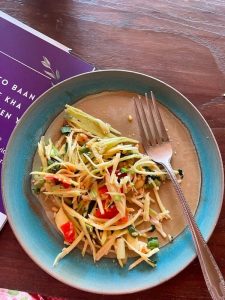 Ingredients
Ingredients
2 small kohlrabi, peeled and cut into matchsticks
3 garlic cloves, peeled
1-2 long red chillis (or more if you like spicy)
3 cherry tomatoes, halved
a small handful of green beans, cut into 2cm lengths
¼ cup roasted peanuts
pinch of coconut sugar (optional)
1-2 teaspoons tamarind pulp (or lemon juice)
juice of 1-2 limes
soy sauce to taste
Method
In a mortar and pestle, lightly crush the garlic and chilli with a little salt. Add the green beans and bruise, then the tomatoes and lightly bruise to release the juice. Add a good dash of soy sauce, the sugar, tamarind and lime juice. Taste and adjust.
Add the kohlrabi and use a spoon to mix it in well.
Add the peanuts and serve.
[Read more articles by Julie on cooking various unusual vegetables.]
[If Julie’s article inspires you to want to eat kohlrabi, you might be interested in Robin Gale-Baker’s article on our website about how to grow kohlrabi.]
Hayden’s unusual bush food of the month – native thyme
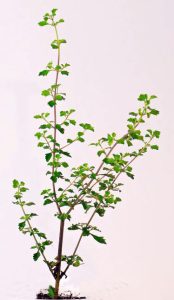 [Hayden Marks is the founder of Melbourne Bushfood, who sell a wide range of bush foods (both the foods themselves and the plants) which you can buy either online or at their shop at 49 Sparks Avenue, Fairfield, Wednesday to Sunday, 10am-4pm.]
[Hayden Marks is the founder of Melbourne Bushfood, who sell a wide range of bush foods (both the foods themselves and the plants) which you can buy either online or at their shop at 49 Sparks Avenue, Fairfield, Wednesday to Sunday, 10am-4pm.]
Native thyme (Prostanthera incisa), which is a part of the mint family, holds a deeper flavour than found in other mints, with earthy notes and a slight pepperiness.
To harvest, just pluck fresh leaves off the growing plant or cut off whole stalks. Both leaf and stem may be used – fresh, or chopped and dried for later use. Just remember that the flavour will fade over time after harvesting.
The plant is an evergreen shrub which grows to around 2 metres tall and wide. Alternatively known as cut-leaf mint-bush, it flowers in early spring, with small, bright pink/purple flowers, similar to other mint-bushes. It is fast growing, with annual pruning encouraging new growth. It also grows well in pots, playing a similar role to a rosemary shrub.
Here is a recipe for wattleseed and thyme damper.
Willsmere Station Community Garden’s first ever crop swap
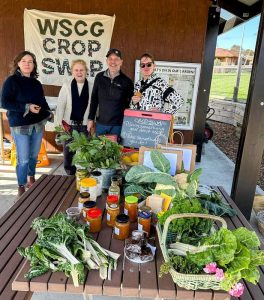 As you may know from previous newsletters, Willsmere Station Community Garden held its first ever crop swap (aka food swap) on 9th September. Tahlia Sleeman has now reported in: “Our first Crop Swap was small, but enthusiastic! The array of produce laid out on the table was quite astonishing. We had contributions of vibrant fresh herbs, wonderful citrus marmalades & cordials, heads of cauliflower, medlar jelly, incredible sourdough loaves, lush silverbeet, wild apple paste, lots of lemons and – the winner of the ‘most unusual’ item – water chestnuts. We can’t wait to see what pops up at the next swap on Saturday, 14th October.”
As you may know from previous newsletters, Willsmere Station Community Garden held its first ever crop swap (aka food swap) on 9th September. Tahlia Sleeman has now reported in: “Our first Crop Swap was small, but enthusiastic! The array of produce laid out on the table was quite astonishing. We had contributions of vibrant fresh herbs, wonderful citrus marmalades & cordials, heads of cauliflower, medlar jelly, incredible sourdough loaves, lush silverbeet, wild apple paste, lots of lemons and – the winner of the ‘most unusual’ item – water chestnuts. We can’t wait to see what pops up at the next swap on Saturday, 14th October.”
Want to volunteer in Preston?
Bridge Darebin is looking for a volunteer garden coordinator to spend around 3 hours per week. The responsibilities will include: water all planters/pots/garden beds; weed and maintain?planters/pots/garden beds; decide on what to plant; collect worm castings, place into soil in planters/pots/garden beds; and occasionally guide ad hoc garden volunteers. Read more and potentially apply.
The Melbourne ‘Local Food Connections’ community radio show
This upcoming Sunday’s episode will feature Paul and Robin Gale-Baker talking about the Transition Movement. Listen on 3CR (855 AM) on Sunday morning, 10-10.30am, by tuning into either the station (855 AM) or its livestream.
Audio recordings of previous episodes are available on their website.
Something for you to watch
Mark Valencia, aka Self Sufficient Me, from Queensland, produces numerous videos about all aspects of growing veggies and fruit.
Which link was clicked most times in the last newsletter?
The most popular link in the last newsletter was Robin Gale-Baker’s article on seaweed tonics versus liquid nitrogen fertilisers.
 Joke (or pun) of the week
Joke (or pun) of the week
A Grandfather tells his Grandson, “When I was a boy, you could go into a store with change in your pocket and come out with a loaf of bread, lunch and a bottle of milk.”
The Grandson replies, “You can’t do that anymore Grandpa, there’s too many cameras now“.
Regular activities over the coming week
Farmers’ and other food markets
- Friday: Community Grocer, Carlton and Farm Raiser farmgate (Bellfield).
- Saturday: Carlton, Coburg and Farm Raiser farmgate (Bellfield).
- Sunday: Alphington, Eltham and Whitehorse.
- Tuesday: Community Grocer, Fitzroy.
- next Wednesday: Really Really Free Market (Coburg).
North East Region Permaculture (NERP) will be at Eltham Farmers’ Market, where their topic of the month will be bushfire preparedness: “It’s time to clean up your property, update and practice your fire plan and chat to your friends and neighbours about the subject..”
Food swaps
- Saturday: Bayswater North, Brunswick East, Collingwood, Fitzroy, Heidelberg West, Mernda, Pascoe Vale and Glenroy, Rosanna and Warrandyte.
- Sunday: zip.
Community gardens
- Thursday: Buna (Heidelberg West), Diamond Valley Library (Greensborough), Edible Hub (Hurstbridge), SEEDs (Brunswick) and Whittlesea.
- Friday: Reynard Street (Coburg) and West Brunswick.
- Saturday: Links (Lalor), Macleod and Thrive (Diamond Creek).
- Sunday: Bellfield, Croxton / Marra Guwiyap open garden (Northcote), Fawkner Food Bowls, Pentridge (Coburg), Regent (Reservoir) and West Brunswick.
- Monday: Panton Hill, SEEDs (Brunswick) and Whittlesea.
- Tuesday: Diamond Valley Library (Greensborough) and Watsonia.
- Next Wednesday: Bellfield, Eltham Neighbourhood House, Macleod, Newton Street (Reservoir), Span (Thornbury) and Sylvester Hive (Preston) .
Not local but interesting
Mush Fest, a community fungi festival; Saturday, 14th October, 10am-3pm and Sunday, 15th October, midday-5pm; free on Saturday, $10 on Sunday; Kensington.
On Saturday, tour the Kensington Stockyard Food Gardens and wander through the community market. Book yourself into workshops on: how to brew your own kombucha by The Good Brew Company at 11.30am-12.30pm (cost $45); how to make mushroom risotto by Tuan from Elder Roots at 12.45-1.45pm ($10); and how to cultivate King Straphoria mushrooms by Tamara Griffiths at 1.30-3.30pm ($45). On Sunday, there will be a mushroom cooking demo between midday and 1pm, a talk about how mushrooms protect tigers and a panel discussion on mushrooms and medicine.
Not food-related but interesting
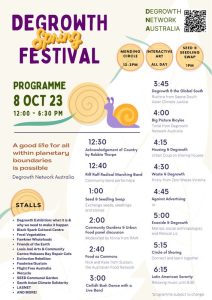
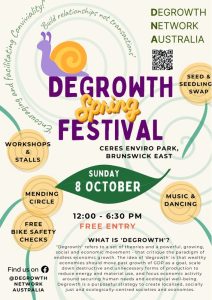 Degrowth Spring Festival; Sunday, 8th October, midday-6.30pm; free; Brunswick East.
Degrowth Spring Festival; Sunday, 8th October, midday-6.30pm; free; Brunswick East.
Degrowth is an idea that critiques the global capitalist system which pursues economic growth at all costs. The day will involve workshops, talks, stalls, a seed/seedling swap, music, food, and dancing (see the graphics right). Hear from community groups, activists and researchers on the day who are doing work in the degrowth space and learn how you can get involved.
Loving our lizards through reptile-friendly gardening; Monday, 30th October, 7-8.30pm; free; Nunawading.
Ecologist David De Angelis will discuss how you can attract lizards to your garden. He will cover the features of a good lizard longue and the types of lizards we are likely to find locally. This event will be streamed live but not recorded.
Sustainable Macleod Clean Energy Expo; Sunday, 19th November, 11am-3pm; free; Macleod.
The expo will showcase a range of clean energy solutions, including insulation, solar power, heat pumps, insulating coatings, with energy assessments to help residents to decide how to make the best use of what is available for their homes. Bryce Gaton will also run a workshop (cost $10) on whether or not it’s now the time to make the switch to an electric car.
Upcoming face-to-face events – not cooking
Fermenting hope in a world out of balance; Thursday, 12th October, 6.30-8pm; $19 ($12 per hour); Fitzroy North.
Join Sharon Flynn of the Fermentary in conversation with Kirsten Bradley, author of The Milkwood Permaculture Living Handbook – to discuss ideas for fermenting hope, community and regeneration, in a world out of balance. There will be some light nibbles, drinks and book signings.
Introduction to bees; Saturday, 14th October, 9.30am-midday; $20 ($8 per hour); Kinglake.
Listen to some local beekeepers talk about bee antics, discover how to get started and what’s involved in looking after your own bee hive. Organised by Kinglake Ranges Neighbourhood House.
Spring gardening workshop (for children); two occurrences on Saturday, 14th October at 11.30am-12.30pm and 1-2pm;free; Macleod.
Children will be able to sow veggie seeds and plant seedlings – and take home their plants. They can also learn about composting and get hands-on with worms. For kids who enjoy getting arty fun, there will be a junior art area with Jodi Wiley. Children must be accompanied by an adult. Organised by Sustainable Macleod.
Oakhill Farm’s 2nd birthday party; Saturday, 28th October, 2-4pm; free; Preston.
Enjoy some birthday cake, pick up some free seedling and mushroom mulch, take a tour of the farm and catch a mushroom growing demonstration by Buttons from the Mushroomery. They will also be running chalk drawing and seed sowing activities for kids of all ages.
Composting workshop and community garden tour; Sunday, 19th November, 10.30am-12.30pm; free; Bellfield.
Learn the tips and tricks to make great compost. Find out more about different containers, worm farming and bokashi buckets. Then take a tour of the community garden to see first hand how your garden can benefit from compost. Organised by Bellfield Community Garden.
Eltham Wine Show; Sunday, 19th November, 10.30am-2.30pm; $20; Bulleen.
Australia’s largest amateur wine show. Hundreds of wines will be available for tasting – red, white, sparkling and fortified grape wines. Also, meads, ciders, country wines, kombuchas and liqueurs. Wine awards and presentations.
Growing native edibles; Thursday, 23rd November, 10.30am-midday; free; Carlton North.
Explore the diverse world of Australian native foods and learn how to harvest them in your own garden. Engage your senses as you see, touch, and smell these plants, and savour the experience by trying a selection of teas made with native ingredients. Presenters: Cultivating Community.
Beeswax wraps; Saturday, 25th November, 10am-midday; $80 ($40 per hour); CERES.
What you will learn: how to make and maintain their own beeswax wraps; learn skills that are transferable to the home environment; and bundling techniques. This is a hands-on workshop where participants will make their own washable and re-usable ready-to-use beeswax wraps. Presenter: Emma Grace.
In-depth mushroom cultivation workshop; Sunday, 26th November, 10am-4pm; $149 ($25 per hour); Alphington.
You will learn the growing methods for oyster mushrooms, including inoculation & sterilisation, and be introduced to basic mycology. You will undertake practical sessions and learn how to start master cultures. You will also be given a tour of the mushroom farm. Take a clean 5-10L bucket with a lid and some gloves. Presenter: Button. Organised by The Mushroomery.
In October
- Keeping backyard chickens; Wednesday, 4th October, 6.30-8pm; free; Doncaster.
- Keeping chickens with Ella Boyen; Wednesday, 4th October, 6.30-8.30pm; free; Doncaster.
- Diabetes and healthy eating for older adults; Thursday, 5th October, 11am-12.30pm; free; Lalor.
- Urban foraging 101; Saturday, 7th October, 10am-midday; free; South Morang.
- Marketing your product; Saturday, 7th October, 10am-2pm; $125 ($31 per hour); Northcote.
- Queensland fruit fly – what you can do; Saturday, 7th October, 10.30-11.30am; free; Lilydale.
- Edible weeds walk; Saturday, 7th October, 10.30am-12.30pm; $30 ($15 per hour); Coburg.
- Edible weeds walk; Saturday, 7th October, 1.30-3.30pm; $30 ($15 per hour); Coburg.
- Croxton / Marra Guwiyap Community Garden open garden; Sunday, 8th October, 11am-2pm; free; Northcote.
- Spoil to soil; Monday, 9th October, 9.30am-12.30pm; free; Brunswick.
- Rosés from around the world; Tuesday, 10th October, 6-8pm; $65 ($33 per hour); Abbotsford.
- Reducing food waste at home; Wednesday, 11th October, 5-7pm; free; Preston.
- Growing food at home (10 sessions); Consecutive Thursdays from 12th October, 9.30am-1pm; $93 ($3 per hour); Heidelberg West.
- Fermenting hope in a world out of balance; Thursday, 12th October, 6.30-8pm; $19 ($12 per hour); Fitzroy North.
- Archie Rose x Cheese Culture x Moon Dog pairing experience; Thursday, 12th October, 7.30-9.30pm; $84 ($42 per hour); Preston.
- Urban food gardening (10 sessions); on consecutive Fridays, starting 13th October, 9.30am-1.30pm; $50 ($1 per hour); Brunswick.
- Kevin Heinze GROW Spring Fair (Coburg); Saturday, 14th October, 9am-3pm; gold coin; Coburg.
- Kevin Heinze GROW Spring Fair (Doncaster); Saturday, 14th October, 9am-3pm; gold coin; Doncaster.
- Introduction to bees; Saturday, 14th October, 9.30am-midday; $20 ($8 per hour); Kinglake.
- Citrus tree pruning workshop; Saturday, 14th October, 10am-midday; free; Bundoora.
- Growing great tomatoes; Saturday, 14th October, 10am-3pm; $120 ($24 per hour); CERES.
- Edible weeds walk; Saturday, 14th October, 10.30am-12.30pm; $30 ($15 per hour); Coburg.
- Spring gardening workshop (for children); Saturday, 14th October, 11.30am-12.30pm;free; Macleod.
- Rushall Community Garden open day; Saturday, 14th October, 12.30-3pm; free; Fitzroy North.
- Spring gardening workshop (for children); Saturday, 14th October, 1-2pm;free; Macleod.
- Summer veggies workshop (garden tour); Saturday, 14th October, 1-4pm; free; Park Orchards.
- Composting, worm farming and Bokashi; Saturday, 14th October, 1.30-2.30pm; free; Ringwood.
- Edible weeds walk; Saturday, 14th October, 1.30-3.30pm; $30 ($15 per hour); Coburg.
- Your happy vegetable garden memory turned to art; Sunday, 15th October, 1.30-3.30pm; free; Reservoir.
- Unwrapped – food and beverage quick bites; Tuesday, 17th October, 7-9.15am; free; Epping.
- Composting, worm farming and Bokashi workshop; Tuesday, 17th October, 10.30am-midday; free; Bayswater North.
- Awara open garden; Sunday, 22nd October, 10-11.30am; $20 ($14 per hour); Pascoe Vale South.
- DIY mushrooms; Sunday, 22nd October, 10am-4pm; $175 ($29 per hour); CERES.
- Edible weed walk; Sunday, 22nd October, 10.30am-12.30pm; free; Heidelberg West.
- Watch it grow; Tuesday, 24th October, 4-5pm; free; Edendale.
- Reducing food waste at home; Wednesday, 25th October, 5-7pm; free; Preston.
- Urban food gardening (8 sessions); consecutive Thursdays starting 26th October, 10am-2.30pm; $80 for all 8 sessions; Edendale.
- Community garden tour; Saturday, 28th October, 10am-2.30pm; $10; Banyule.
- Home brewing; Saturday, 28th October, 10am-2.30pm; $100 ($22 per hour); CERES.
- Organic vegetable gardening; Saturday, 28th October, 10am-3pm; $120 ($24 per hour); CERES.
- Foraging workshop; Saturday, 28th October, 1-3pm; $10; Ringwood.
- Oakhill Farm’s 2nd birthday party; Saturday, 28th October, 2-4pm; free; Preston.
- Edible weeds; Sunday, 29th October, 10am-midday; $60 ($30 per hour); CERES.
In November
- Community soup night; Wednesday, 1st November, 5-7.30pm; free; Preston.
- Edibles in small spaces with Duncan Cocking; Wednesday, 1st November, 6.30-8.30pm; free; Doncaster.
- Basic inoculation workshop; Saturday, 4th November, 2-4pm; $87 ($44 per hour); Alphington.
- Reducing food waste at home; Wednesday, 8th November, 5-7pm; free; Preston.
- Nutrition and menopause – nourishing the transition; Wednesday, 8th November, 6.45-8.30pm; free; Hawthorn.
- Grounded at TarraWarra; Friday, 10th November, 3-6.30pm; $88 ($25 per hour); Yarra Glen.
- Backyard beekeeping basics; Saturday, 11th November, 11am-1pm; $80 ($40 per hour); CERES.
- Chardonnay + fromage; Saturday, 11th November, midday-3pm; $60 ($20 per hour); Warrandyte South.
- Urban wine walk; Saturday, 11th November, midday-4pm; $82; Fitzroy.
- Setting up a worm farm; Saturday, 11th November, 2-3.30pm; free; Edendale.
- Awara open garden; Sunday, 12th November, 10-11.30am; $20 ($14 per hour); Pascoe Vale South.
- Installing drip line irrigation with Angelo Eliades; Sunday, 12th November, 1-3pm; $15; Macleod.
- Food photography; Sunday, 12th November, 2-5pm;$109 ($36 per hour); Eltham.
- Introduction to horticultural permaculture (4 sessions); consecutive Wednesdays starting 15th November, 10am-2.30pm; $50 for all 4 sessions; Edendale.
- Smart storage to reduce food waste workshop; Thursday, 16th November, 6.30-7.30pm; free; Ringwood.
- Kitchen medicine – garden farmacy; Saturday, 18th November, 10am-2.30pm; $120 ($27 per hour); CERES.
- Working with water with Dan; Saturday, 18th November, 10am-3.30pm; $15 ($3 per hour); Edendale.
- Mushroom farm tour; Saturday, 18th November, 2-2.30pm; $27 ($54 per hour); Alphington.
- Composting workshop and community garden tour; Sunday, 19th November, 10.30am-12.30pm; free; Bellfield.
- Eltham Wine Show; Sunday, 19th November, 10.30am-2.30pm; $20; Bulleen.
Regular events
- Beekeeping workshop; roughly once a month on Saturdays, 1-3.30pm; $85 ($34 per hour); Brunswick East.
- Carlton aperitvio food tour; every Friday, 5-7pm; $139 ($70 per hour); Carlton.
- Classic cocktails; various Tuesdays, 7-10pm; $70 ($23 per hour); Fitzroy.
- Edible Forest tours; every Friday and Saturday, 11am-1pm and again at 1-3pm; $25 ($13 per hour); Dixons Creek.
- Eltham trails (walking food tour); various Saturday mornings and Thursday evenings; $65 ($22 per hour); Eltham.
- Flavours of Coburg food tour; 3rd Saturday of each month, 10am-1pm; $65 ($22 per hour); Coburg.
- Gin making masterclass; most Saturdays, 10am-1pm; $175 ($58 per hour); Nunawading.
- Gin masterclass; most Saturdays and Sundays, midday-1pm; $80 ($80 per hour); Eltham.
- Ratio Cocoa Roasters behind the scenes chocolate factory tour; various Fridays and Saturdays; $20 ($14 per hour); Brunswick.
- Truffle workshop at Ratio Cocoa Roasters; 3rd Sunday of each month, 11am-1pm; $75 ($38 per hour); Brunswick.
- Wine tasting masterclass; various Saturdays, 3-4pm; $86 ($86 per hour); Preston.
Upcoming face-to-face events – cooking
Water kefir, wild mead and beet kvass; Sunday, 22nd October, 11.30am-2pm; $180 ($72 per hour); Fitzroy North.
Make and take home three large jars full of mead, beet kvass and water kefir with the SCOBY, plus a bottle of second fermenting water kefir that’ll be ready the next day.
Farmhouse sake (doburoku); Thursday, 2nd November, 7-8.30pm; $125 ($84 per hour); Fitzroy North.
Make your own sake using rice, koji and water and time. This is a 3 step process and you’ll take home stage one in a 3 litre jar – with koji for step 2 – and a couple of bottles for the final bottling step. Also taste some doburoku at different stages of its fermentation process.
Colombian cooking workshop; Saturday, 18th November, 10am-1pm; $65 ($22 per hour); Balwyn North.
Learn how to make empanadas using corn flour and a variety of fillings. You’ll also get to make a dessert. Presenter: Verena Puello, from Donde Mama. Organised by Trentwood at the Hub.
Christmas cookie decorating; Saturday, 18th November, 1-4pm; $50 ($17 per hour); Ringwood North.
Decorate pre-made biscuits with fondant icing, stamp out your design and embellish with food safe paint, sparkles and other edible bling. Organised by North Ringwood Community House.
Sourdough breadmaking (2 sessions); on Saturdays, 18th and 25th November, both 10am-12.30pm; $150 ($30 per hour); Park Orchards.
In the first session, Nadine will take you through the basics of sourdough breadmaking. In the second session, you will make a seeded sourdough loaf. You will also get to sample different loaves, including a fruit loaf and olive and herb loaf. This class is best suited to those who have some experience with bread making, however it is not essential. Organised by Park Orchards Community House.
In October
- Jaclyn Crupi – pasta love; Wednesday, 4th October, 6.30-8pm; free; Fitzroy North.
- The cook program (9 sessions); on Thursdays starting 5th October, 9.30am-1.30pm; $50 ($1 per hour); Brunswick.
- Fermenting vegetables for beginners with Jen Willis; Thursday, 5th October, 7.30-9.30pm; free; Bundoora.
- More than a loaf of bread; Saturday, 7th October, 10am-12.30pm; $51 ($20 per hour); Brunswick.
- Herbal tea workshop with Monique; Saturday, 7th October, 10.30-11.45am; $59 ($47 per hour); Northcote.
- Handmade sobagaki workshop with Rieko Hayashi; Saturday, 7th October, 11am-1pm; $75 ($38 per hour); Fitzroy North.
- Sri Lankan cooking class; Monday, 9th October, 6-8.30pm; $95 ($38 per hour); Surrey Hills.
- Cooking with your grandkids; Tuesday, 10th October, 11am-12.30pm; $10; Hurstbridge.
- Cooking from the pantry (9 sessions); on 9 consecutive Tuesdays from 10th October, 9.30am-midday; $50 ($2 per hour); Lower Templestowe.
- Sourdough basics; Thursday, 12th October, 6.30-8.30pm; $120 ($60 per hour); Collingwood.
- Japanese cooking class – curry; Friday, 13th October, 1-2.30pm; $15; Greensborough.
- Food storage workshop with Open Table; Saturday, 14th October, 2-4pm; free; Carlton.
- Sourdough bread making; Sunday, 15th October, 10am-1pm; $55 ($18 per hour); Panton Hill.
- Soft fresh cheese making including goats cheese; Sunday, 15th October, 10am-3pm; $240 ($48 per hour); CERES.
- FFS … ferment four staples; Sunday, 15th October, 11.30am-4.30pm; $425 ($85 per hour); Fitzroy North.
- Cooking with your grandkids; Tuesday, 17th October, 11am-12.30pm; $10; Box Hill.
- Jaclyn Crupi; Wednesday, 18th October, 2-3pm; free; Northcote.
- Cooking for one (5 sessions); on Thursdays, starting 19th October, 11am-1pm; $50 ($5 per hour); Lilydale.
- Kombucha / Jun M.O.B.; Thursday, 19th October, 6.30-8.30pm; $150 ($75 per hour); Fitzroy North.
- Warm up with no waste cooking; Thursday, 19th October, 7-8.30pm; free; Thomastown.
- Sourdough; Saturday, 21st October, 10.30am-1.30pm; $130 ($43 per hour); Kinglake.
- No waste cooking on an induction cooktop; Saturday, 21st October, 11am-12.30pm; free; Diamond Creek.
- Croquembouche workshop; Saturday, 21st October, 1.30-5.30pm; $134 ($34 per hour); Lower Templestowe.
- Vegan chocolate making; Sunday, 22nd October, 10-11.30am; $80 ($53 per hour); Collingwood.
- Three ways with red curry paste; Sunday, 22nd October, 10.30am-3pm; $190 ($42 per hour); Panton Hill.
- Pizza masterclass with Antonio; Sunday, 22nd October, 11am-2pm; $86 ($29 per hour); Eltham.
- Water kefir, wild mead and beet kvass; Sunday, 22nd October, 11.30am-2pm; $180 ($72 per hour); Fitzroy North.
- Finger foods to make at home; Tuesday, 24th October, 6-8.30pm; $65 ($26 per hour); Hawthorn.
- Cooking for one; Tuesday, 24th October, 7-8.30pm; free; Eltham.
- Nutrition and food literacy (6 sessions); on Thursdays, starting 26th October, 9.30am-12.30pm; $70 ($4 per hour); Preston.
- Croissants workshop; Saturday, 28th October, 1.30-4pm; $64 ($26 per hour); Lower Templestowe.
- Healthy cooking hacks for families; Saturday, 28th October, 2-3.30pm; free; Lalor.
- Tasty meals; Sunday, 29th October, 2-3.30pm; free; Ivanhoe.
In November
- Macarons workshop; Wednesday, 1st November, 6-8pm; $91 ($46 per hour); Lower Templestowe.
- Farmhouse sake (doburoku); Thursday, 2nd November, 7-8.30pm; $125 ($84 per hour); Fitzroy North.
- Growing and cooking with bushfoods; Saturday, 4th November, 10am-3pm; $120 ($24 per hour); CERES.
- Pasta making class with Piera; Saturday, 11th November, 10am-1pm; $140 ($47 per hour); Thomastown.
- Mozzarella, burrata and stracciatella cheese making; Saturday, 11th November, 10am-3pm; $240 ($48 per hour); CERES.
- Christmas cake workshop; Saturday, 11th November, 1.30-3pm; $56 ($38 per hour); Lower Templestowe.
- Vegan cooking Italian style; Sunday, 12th November, 10am-3pm; $120 ($24 per hour); CERES.
- Gingerbread house workshop; Tuesday, 14th November, 7-8.30pm; $30 ($20 per hour); Greensborough.
- Japanese cooking class – shiratama mochi rice sundae; Wednesday, 15th November, 1-2.30pm; $15; Greensborough.
- Dumpling making workshop; Friday, 17th November, 6.30-8.30pm; $75 ($38 per hour); Park Orchards.
- Colombian cooking workshop; Saturday, 18th November, 10am-1pm; $65 ($22 per hour); Balwyn North.
- Christmas cookie decorating; Saturday, 18th November, 1-4pm; $50 ($17 per hour); Ringwood North.
- Sourdough breadmaking (2 sessions); on Saturdays, 18th and 25th November, both 10am-12.30pm; $150 ($30 per hour); Park Orchards.
- Gingerbread house workshop; Tuesday, 21st November, 7-8.30pm; $30 ($20 per hour); Greensborough.
Regular classes
- Al dente cooking (Italian); most Saturdays, 9am-1pm; $155 ($39 per hour); Chirnside Park.
- BBQ classes; various days and times; $135-150 ($45-50 per hour); Brunswick East.
- Bread making; various Sundays, 8am-2pm; $230 ($38 per hour); Abbotsford.
- Brunswick Kitchen (many different classes); various dates, times and prices but mostly 2½ hours long and $120; Brunswick.
- Chocolate making and pastry classes for children; various days and times; various costs; Yarra Glen.
- Chocolate making workshop; various Thursdays, Fridays and Saturdays; $152 ($38 per hour); Blackburn.
- Chocolate making workshop; various Saturdays and Sundays; $125 ($63 per hour); Box Hill North.
- Kombucha brewing workshop; last Thursday of each month, 7-11pm; $49 ($12 per hour); Brunswick.
- La Cucina di Sandra (Italian); various evenings, 6.30-10.30pm; $120 ($30 per hour); Richmond.
- Margot & Montanez (alfajores biscuits); monthly on Sundays, 10am-1pm ; $109 ($36 per hour); Camberwell.
- Nonna & Mum’s cooking class; 4th Thursday of each month, 7-10pm; $24 ($8 per hour); Thornbury.
- Otao Kitchen (many different classes); various dates, times and prices but mostly 3 hours long and $197; Abbotsford.
- Rosa’s cooking classes (Italian); various Saturdays and Sundays, 10.15am-3pm; mostly $165 ($35 per hour); Bundoora.
- Sourdough bread workshop; roughly once a month on Saturdays, 9-11.30am; $185 ($74 per hour); Brunswick East.
- Taiwanese cooking; 1st Saturday of each month, midday-2.30pm; $126 ($50 per hour); Brunswick.
- Tea blending; various Sundays; $75 ($60 per hour); Brunswick.
- The ultimate biscuit class; various Tuesdays, 10am-3pm; $162 ($32 per hour); Blackburn.
